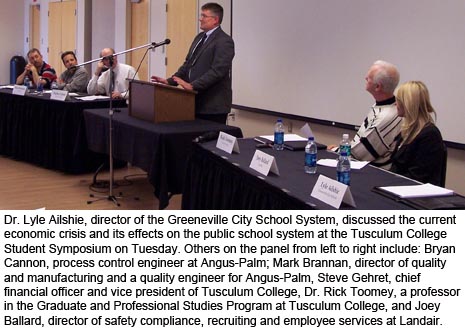A panel of local business, education, corporate, financial and human resource experts provided insight and answered questions for Tusculum College students, staff, faculty and the community at a symposium held Tuesday at the College.
The event, sponsored by the Tusculum College Corporate Relations Program of the Office of Institutional Advancement, brought together a panel of community experts to address the business challenges they face in dealing with the current economic crisis.
“The goal of the symposium was to bring in experts in the various sectors of the business community and let them talk about how the economic crisis is affecting their business and what steps they are taking in order to preserve their business under the current climate,” said Kim Kidwell, associate director of development for Tusculum College.
Participating in the panel discussion were Dr. Lyle Ailshie, director of the Greeneville City School System; Stephen Gehret, chief financial officer and vice president of Tusculum College; Joey Ballard, director of safety compliance, recruiting and employee services at Landair; Mark Brannan, director of quality and manufacturing and a quality engineer for Angus-Palm and Bryan Cannon, process control engineer at Angus-Palm.
The panel was moderated by Dr. Rick Toomey, a professor in the Graduate and Professional Studies Program at Tusculum College.
Gehret addressed the economic situation from an accounting perspective and told the group that there are five reasons that the current recession is comparable to the one experienced between 1988 and 1993, including tight credit markets, consumer confidence being near an all-time low, high unemployment levels and fear of job loss, a depressed housing market and the instability of the stock market.
“The difference in this recession is that it is global in nature,” Gehret said. Adding that it will take more than an American turn-around to stimulate the economy, and that other countries need to begin to once again spend with confidence as well.
Gehret said that as a private college, Tusculum College will need to focus on remaining affordable as there will be fewer numbers of students who will be able to afford a private college education.
Ballard addressed concerns of human resource professionals as their companies try to remain competitive in a depressed economy. She told the group that it is important that during these times that leadership doesn’t lose credibility.
“We need to be honest and not sugarcoat,” said Ballard. “We need to communicate to our employees what the company is doing and how they will be affected. In hard times, you often see the company’s true values.”
Ailshie talked to the group about education funding and how reduced consumer purchasing was reflected in lower retail sales and property tax collections, which is how the majority of public education is funded. He added, however, that in Greeneville, the effect had not yet been felt and rural areas were experiencing less of an income reduction.
“It may be hitting here later,” he said, adding that the school system has been budgeting very conservatively. “We can’t generate revenue as a school system, so we are focusing on operating conservatively.”
Ailshie told the group that 10 positions were cut this year in order to trim the budget, but that gas prices stabilizing have helped them stay within budget during tough economic times.
Cannon spoke to the group about his company’s efforts to deal with the difficult economy. Angus Palm has recently had a significant lay off, and in addition, has asked both salaried and hourly personnel to accept a decrease in wage rates.
“The company is experiencing a 40 percent reduction in revenue, and we expect to see that trend continue throughout 2009,” said Cannon.
And while the company has gone from 420 employees to 180, they have not lost business, only volume, which Cannon says has required them to do a lot of cross-training of existing employees in order to keep product moving out the doors.
Cannon said the company’s focus has been on increased production efficiency through using fewer people to complete jobs, by reducing waste and scrap and renegotiating purchasing agreements with their suppliers.
“We’re managing our business well in this difficult time and actually have become a stronger company,” Cannon said.
Following the presentations, questions from the audience focused around the job market for graduates and what to expect in student loans in the near future.
Ailshie encouraged students to make themselves as competitive as possible by offering more flexibility as job candidates. And for education majors, Ailshie said he strongly encouraged them to gain certifications in more than one area.
Gehret told that group that he felt student loans would become more competitive and would be available for those considering graduate school. “Graduate school and continuing your education is a good option in this economic environment.”



